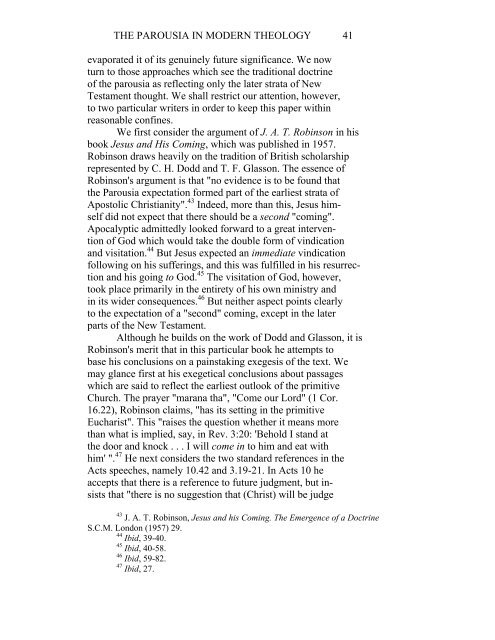the parousia in modern theology: some questions ... - Tyndale House
the parousia in modern theology: some questions ... - Tyndale House
the parousia in modern theology: some questions ... - Tyndale House
Create successful ePaper yourself
Turn your PDF publications into a flip-book with our unique Google optimized e-Paper software.
THE PAROUSIA IN MODERN THEOLOGY 41<br />
evaporated it of its genu<strong>in</strong>ely future significance. We now<br />
turn to those approaches which see <strong>the</strong> traditional doctr<strong>in</strong>e<br />
of <strong>the</strong> <strong>parousia</strong> as reflect<strong>in</strong>g only <strong>the</strong> later strata of New<br />
Testament thought. We shall restrict our attention, however,<br />
to two particular writers <strong>in</strong> order to keep this paper with<strong>in</strong><br />
reasonable conf<strong>in</strong>es.<br />
We first consider <strong>the</strong> argument of J. A. T. Rob<strong>in</strong>son <strong>in</strong> his<br />
book Jesus and His Com<strong>in</strong>g, which was published <strong>in</strong> 1957.<br />
Rob<strong>in</strong>son draws heavily on <strong>the</strong> tradition of British scholarship<br />
represented by C. H. Dodd and T. F. Glasson. The essence of<br />
Rob<strong>in</strong>son's argument is that "no evidence is to be found that<br />
<strong>the</strong> Parousia expectation formed part of <strong>the</strong> earliest strata of<br />
Apostolic Christianity". 43 Indeed, more than this, Jesus him-<br />
self did not expect that <strong>the</strong>re should be a second "com<strong>in</strong>g".<br />
Apocalyptic admittedly looked forward to a great <strong>in</strong>terven-<br />
tion of God which would take <strong>the</strong> double form of v<strong>in</strong>dication<br />
and visitation. 44 But Jesus expected an immediate v<strong>in</strong>dication<br />
follow<strong>in</strong>g on his suffer<strong>in</strong>gs, and this was fulfilled <strong>in</strong> his resurrec-<br />
tion and his go<strong>in</strong>g to God. 45 The visitation of God, however,<br />
took place primarily <strong>in</strong> <strong>the</strong> entirety of his own m<strong>in</strong>istry and<br />
<strong>in</strong> its wider consequences. 46 But nei<strong>the</strong>r aspect po<strong>in</strong>ts clearly<br />
to <strong>the</strong> expectation of a "second" com<strong>in</strong>g, except <strong>in</strong> <strong>the</strong> later<br />
parts of <strong>the</strong> New Testament.<br />
Although he builds on <strong>the</strong> work of Dodd and Glasson, it is<br />
Rob<strong>in</strong>son's merit that <strong>in</strong> this particular book he attempts to<br />
base his conclusions on a pa<strong>in</strong>stak<strong>in</strong>g exegesis of <strong>the</strong> text. We<br />
may glance first at his exegetical conclusions about passages<br />
which are said to reflect <strong>the</strong> earliest outlook of <strong>the</strong> primitive<br />
Church. The prayer "marana tha", "Come our Lord" (1 Cor.<br />
16.22), Rob<strong>in</strong>son claims, "has its sett<strong>in</strong>g <strong>in</strong> <strong>the</strong> primitive<br />
Eucharist". This "raises <strong>the</strong> question whe<strong>the</strong>r it means more<br />
than what is implied, say, <strong>in</strong> Rev. 3:20: 'Behold I stand at<br />
<strong>the</strong> door and knock . . . I will come <strong>in</strong> to him and eat with<br />
him' ". 47 He next considers <strong>the</strong> two standard references <strong>in</strong> <strong>the</strong><br />
Acts speeches, namely 10.42 and 3.19-21. In Acts 10 he<br />
accepts that <strong>the</strong>re is a reference to future judgment, but <strong>in</strong>-<br />
sists that "<strong>the</strong>re is no suggestion that (Christ) will be judge<br />
43<br />
J. A. T. Rob<strong>in</strong>son, Jesus and his Com<strong>in</strong>g. The Emergence of a Doctr<strong>in</strong>e<br />
S.C.M. London (1957) 29.<br />
44<br />
Ibid, 39-40.<br />
45<br />
Ibid, 40-58.<br />
46<br />
Ibid, 59-82.<br />
47<br />
Ibid, 27.

















